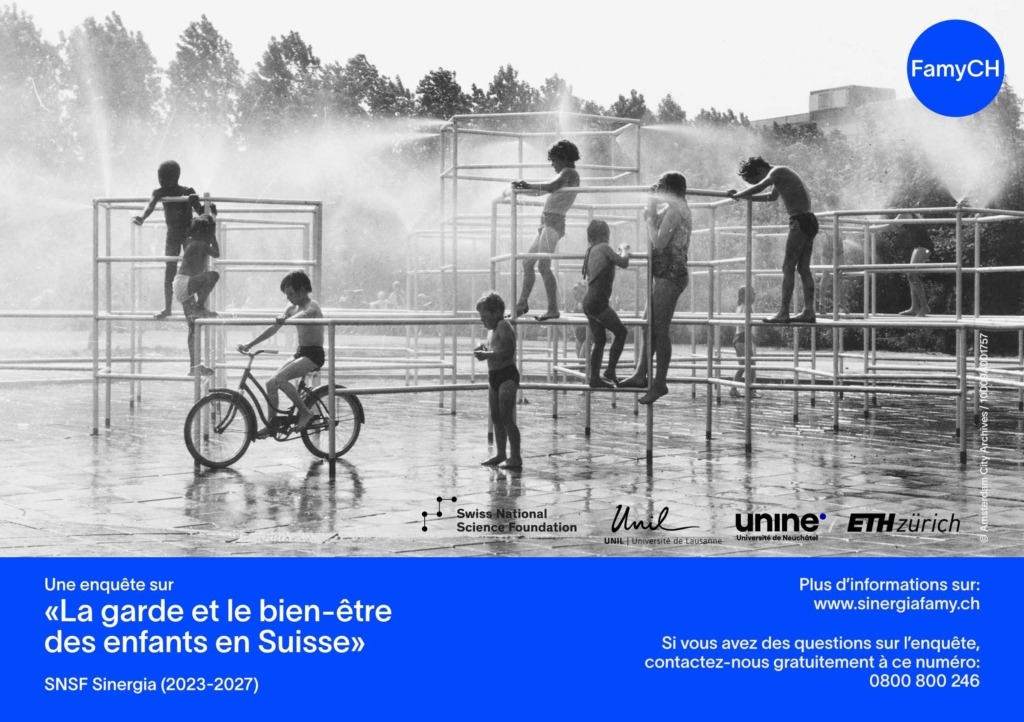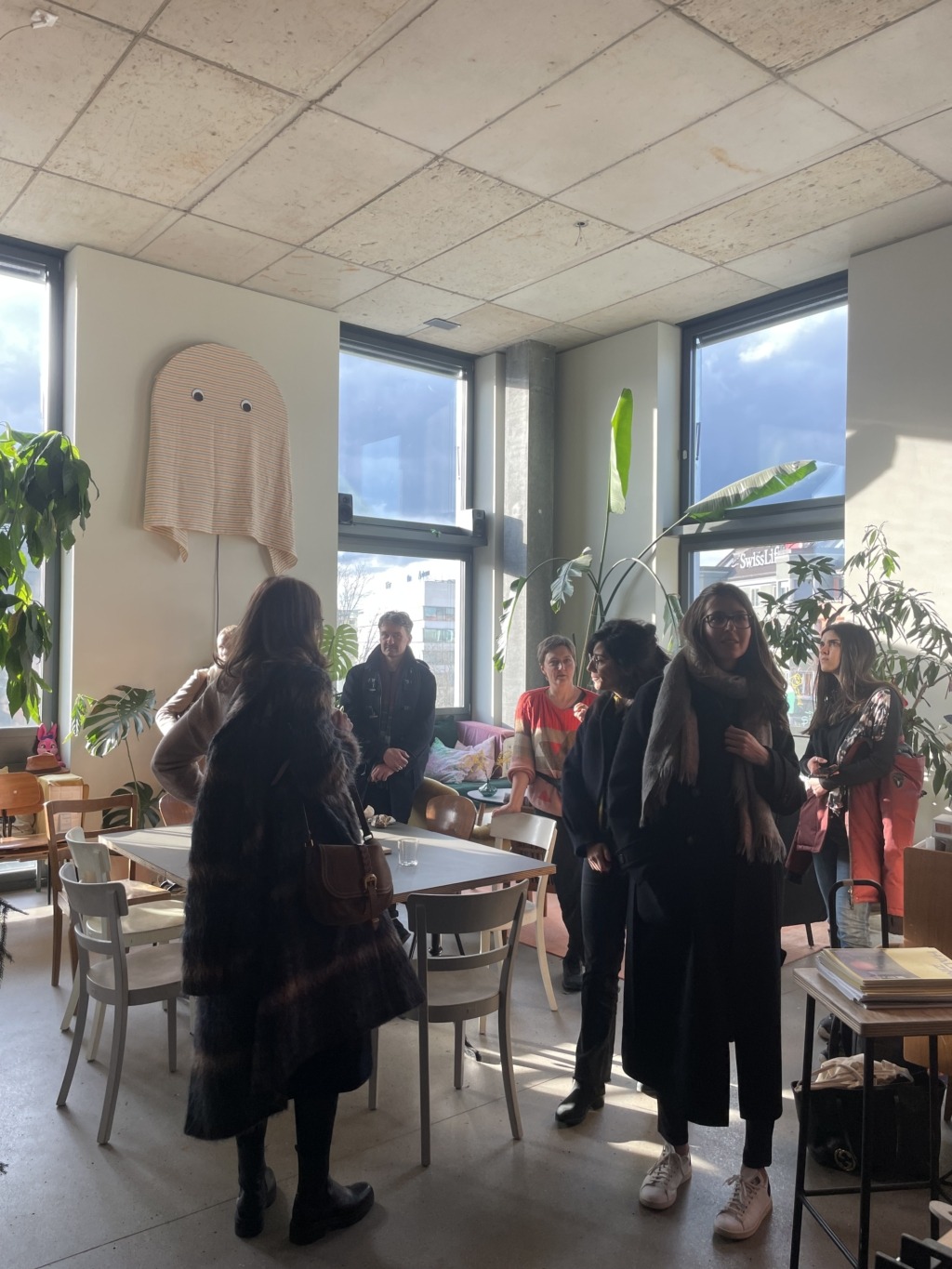Le questionnaire national est actuellement en cours et nous invitons tous ceux et celles qui ont reçu un courrier à y participer. Si vous avez des questions, cliquez ici ou allez sur « Info pour les participant·e·s ».
| Type | Questionnaire national |
| Emplacement | Suisse |

Le concept du bien-être de l’enfant est bien établi dans le droit, le counseling familial, la thérapie et le discours sociopolitique. Cependant, les recherches explorant l’influence de l’environnement de vie des enfants sur leur bien-être subjectif ont longtemps été négligées. Au cours des dernières années, l’étude interdisciplinaire des expériences des enfants a pris de l’ampleur, mais le rôle du logement et l’analyse du logement en tant que facteurs potentiels restent largement sous-explorés. Pour combler cette lacune, une équipe de sociologues, de psychologues, d’architectes et de juristes des Universités de Lausanne et de Neuchâtel, en collaboration avec l’ETH Zurich, a entrepris une étude approfondie. Soutenu par le Fonds national suisse de la recherche scientifique, ce projet (2023-2027) vise à approfondir notre compréhension de la manière dont les conditions de vie façonnent le bien-être des enfants, en apportant des informations précieuses à la fois à la recherche académique et aux applications pratiques.
| Type | Article |
| Auteurs | Mosayebi, E., Sacher, C., & Schlinzig, T. |
| Publication | undKinder. Das MMI-Magazin, 114, 36–38 |
| Link | www.mmi.ch/de-ch/shop/products/nr-114-wenn-eltern-sich-trennen |
The whole team of FamyCH met December 6 at the University of Neuchâtel for workshops.
| Type | Team meeting |
| Date | 06.12.2024 |
| Début | 9:00 am |
| Fin | 5:00 pm |
At the annual conference of the European Multi-locality Studies Network, we presented our ongoing S3 research project examining the impact of architecture and housing on child well-being in post-separation families.
| Type | Presentation |
| Haut-parleurs | Tino Schlinzig |
| Date | 07.11.2024 |
| Emplacement | NMBU - Norwegian University of Life Sciences |
The Sinergia FamyCH team meets at University of Lausanne (UNIL) for the PhD Colloquium taking place every six months.
| Type | Colloquium |
| Date | 04.10.2024 |
| Emplacement | University of Lausanne (UNIL) |
At the annual meeting of the Habitologie network, we presented the ongoing research project focusing on the discourse of child well-being in housing studies.
| Type | presentation |
| Haut-parleurs | Carina Sacher, Tino Schlinzig |
| Date | 19.07.2024 |
| Emplacement | TU Vienna |
| Link | habitologie.project.tuwien.ac.at/ |
At the recent LIVES Day held at the University of Geneva, Giulia F. M. Spagnulo presented the first preliminary results of the SNSF FamyCH project, a pilot daily diary study focused on child well-being, interparental conflict, and mental load. The event, hosted by the Swiss Centre of Expertise in Life Course Research, provided an excellent platform for her to share the initial findings and engage with experts in the field.
| Type | Flash talk |
| Haut-parleurs | Giulia F. M. Spagnulo, Laura M. Vowels, Laura Bernardi & Joëlle Darwiche |
| Date | 30.05.2024 |
| Emplacement | Geneva, Switzerland |
| Link | centre-lives.ch/fr/agenda/lives-day-2024-unige |
| Keywords | FamyCH, Interparental conflict, Mental load, child well-being |
We are delighted to present the Swiss National Science Foundation (SNSF) Sinergia-funded initiative, „Family Custody Arrangements and Child Well-Being in Switzerland 2023-2027“ (FamyCH) at the online kick-off meeting. Since the launch of the project in September 2023, our team has been working diligently on the national survey that will underpin our recruitment of participants for in-depth sub-studies exploring legal, spatial, and relational dimensions. The first wave of the longitudinal survey will take place this summer. We look forward to sharing the objectives and status of the research project with the project partners and advisory board members at the event.
| Date | 07.06.2024 |
| Début | 4:00 pm |
| Fin | 5:00 pm |
| Emplacement | online |
The Sinergia project is presented to experts in statistics and demography at the University Hospital of Geneva (HUG).
| Date | 11.04.2024 |
| Emplacement | University Hospital of Geneva (HUG) |
The Sinergia FamyCH team met at ETH Zurich for the PhD Colloquium taking place every six months. Afterwards, the group visited the performative housing project Stampfenbachstrasse by EMI architects and the Zollhaus by the housing cooperative Kalkbreite planed by Enzmann Fischer Partner AG to discuss spatial aspects relevant for family living.
| Date | 15.03.2024 |
| Emplacement | ETH Zurich |

Our research teams from the University of Lausanne, the University of Neuchâtel and the ETH Zurich will meet for a three-day retreat at the end of January 2024 to work on the national survey.
| Date | 24.01.2024 |
Prof. Joëlle Darwiche presented the research project to experts of the Centre LIVES at the University of Lausanne.
| Type | Presentation |
| Haut-parleurs | Joëlle Darwiche |
| Date | 11.01.2024 |
| Emplacement | University of Lausanne UNIL |
We are thrilled to announce the commencement of our SNF Sinergia Project «Family Custody Arrangements and Child Well-Being in Switzerland» (FamyCH). Our research teams from University of Lausanne, University of Neuchâtel and ETH Zurich launch the project in a first joint meeting with the new PhD students and PostDocs.
| Date | 16.11.2023 |
| Début | 10:00 am |
| Fin | 2:00 pm |
| Emplacement | Neuchâtel |
Joëlle Darwiche presented the Sinergia project at the LIVES DAY at the University of Lausanne.
| Type | Conference |
| Haut-parleurs | Joëlle Darwiche |
| Date | 07.06.2023 |
| Emplacement | University of Lausanne |
| Link | www.centre-lives.ch/sites/default/files/inline-files/Programme%20FINAL_LIVESday_7juin2023_0.pdf |
The purpose of the systematic review was to synthesize the literature on children’s outcomes across different living arrangements (nuclear families, shared physical custody [SPC], lone physical custody [LPC]) by extracting and structuring relevant theoretical hypotheses (selection, instability, fewer resources, and stressful mobility) and comparing the empirical findings against these hypotheses. Following the PRISMA guidelines, the review included 39 studies conducted between January 2010-December 2022 and compared the living arrangements across five domains of children’s outcomes: emotional, behavioral, relational, physical, and educational. The results showed that children’s outcomes were the best in nuclear families but in 75% of the studies children in SPC arrangements had equal outcomes. Children in LPC tended to report the worst outcomes. When compared with the different theoretical hypotheses, the results were the most consistent with fewer resources hypothesis which suggests that children especially in LPC families have fewer relational and economic resources whereas children in SPC families are better able to maintain resources from both parents.
| Type | Research article |
| Auteurs | Laura M. Vowels, Chiara L. Comolli, Laura Bernardi, Daniela Chacón-Mendoza, Joëlle Darwiche |
| Publication | Plos ONE |
| Link | journals.plos.org/plosone/article?id=10.1371/journal.pone.0288112 |